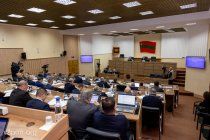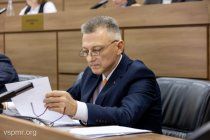 Русский
Русский English
English-







Alexander Korshunov, "The mechanism will reduce the debt burden of our citizens to natural monopoly enterprises"
The Supreme Council has completed work on the Government law-in-draft on amendments to the law "On Enforcement Proceedings". A new measure has been adopted to combat malicious defaulters on utility bills. If the debt for heating, water supply and sanitation services is not paid, the court may consider the possibility of temporarily restricting the supply of electricity to the debtor. if the debtor for payment of heat, water supply and sanitation services has failed to pay off the debt within the period specified in the enforcement document, which is a judicial act, without good reason, the bailiff may issue a ruling on the temporary suspension of the supply of electricity to the debtor until the requirements of the enforcement document are fully met or until the parties reach an agreement.
If the enforcement document on the collection of debt for heat, water supply and sanitation (sewage) is not issued on the basis of a judicial act or is not a judicial act, the claimant or bailiff must apply to the court with an application to establish a suspension of the supply of electricity to the debtor.
Taking into account the amendments adopted in the second reading, proposed by the deputies of the Supreme Council, the law prescribes exceptions "to the rules". It will not be possible to disconnect the supply of electricity to those premises where the following live:
- large families;
- single parents;
- disabled persons of groups I and II;
- orphans and children left without parental care, as well as persons from among orphans and children left without parental care.
The adopted law-in-draft was commented on by the Chairman of the Supreme Council Alexander Korshunov. The speaker emphasized that debts for utilities in recent years have exceeded hundreds of millions of rubles, in connection with which work with debtors has been carried out for a long time.
Similar measures to combat debtors have been established by current legislation until now, however, it was possible to apply them in practice only with respect to electricity. Thus, the Civil Code contains a norm according to which a utility company supplying a service has the right to limit or suspend the supply of the service if payment for it is not made within 4 months. It is almost impossible to disconnect one consumer in an apartment building from a single heating, water supply and sanitation system. Moreover, disconnection from these life support sources poses a threat to human life and health. Therefore, the deputies agreed with the Government's opinion to temporarily disconnect the supply of electricity for debtors for heat, water and sewerage. The amendments and additions to the law "On enforcement proceedings" adopted by the Supreme Council will enter into force 3 months after the official publication.
In addition to the government law-in-draft, the deputies adopted law-in-draft from colleagues from the Legislation Committee on supplementing the Civil Procedure Code of the Pridnestrovian Moldavian Republic. Parliamentarians Galina Antyufeeva and Gregory Dyachenko proposed supplementing the code with a new article regulating the procedure for the court to consider a temporary restriction on the supply of electricity to a debtor.
The additions to the Civil Procedure Code will enter into force on the date of entry into force of the amendments to the law "On enforcement proceedings", establishing the possibility of a temporary complete restriction on the supply of electricity to debtors in the event of failure to comply with the requirements for the collection of debts for heat supply, water supply and sanitation (sewage).




